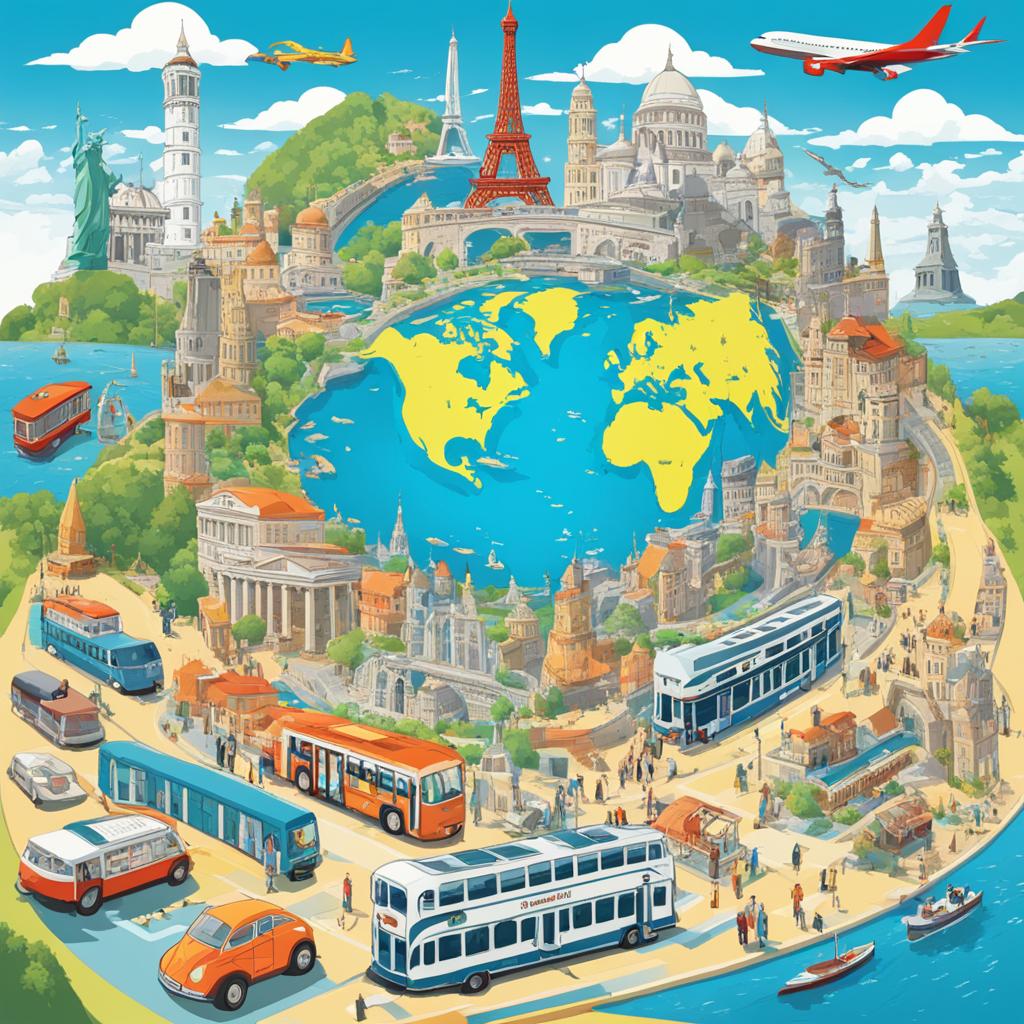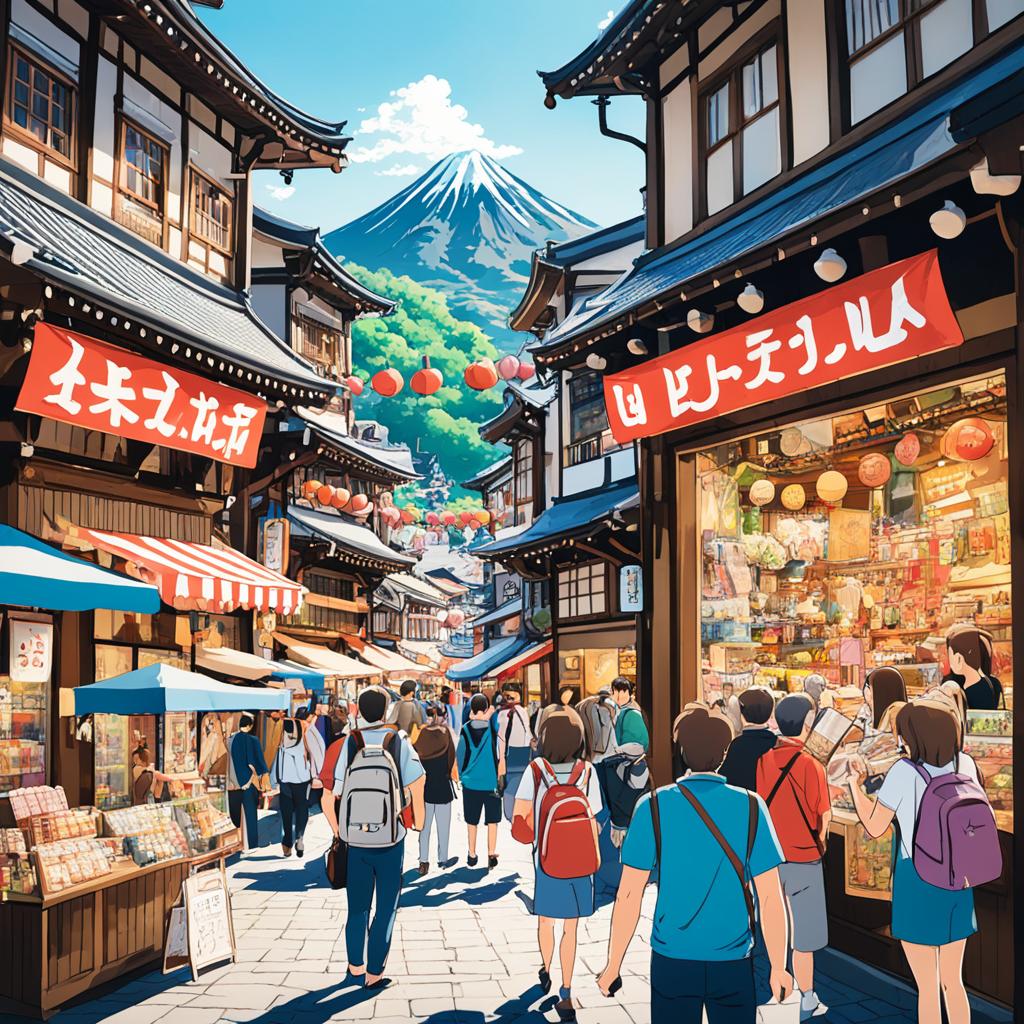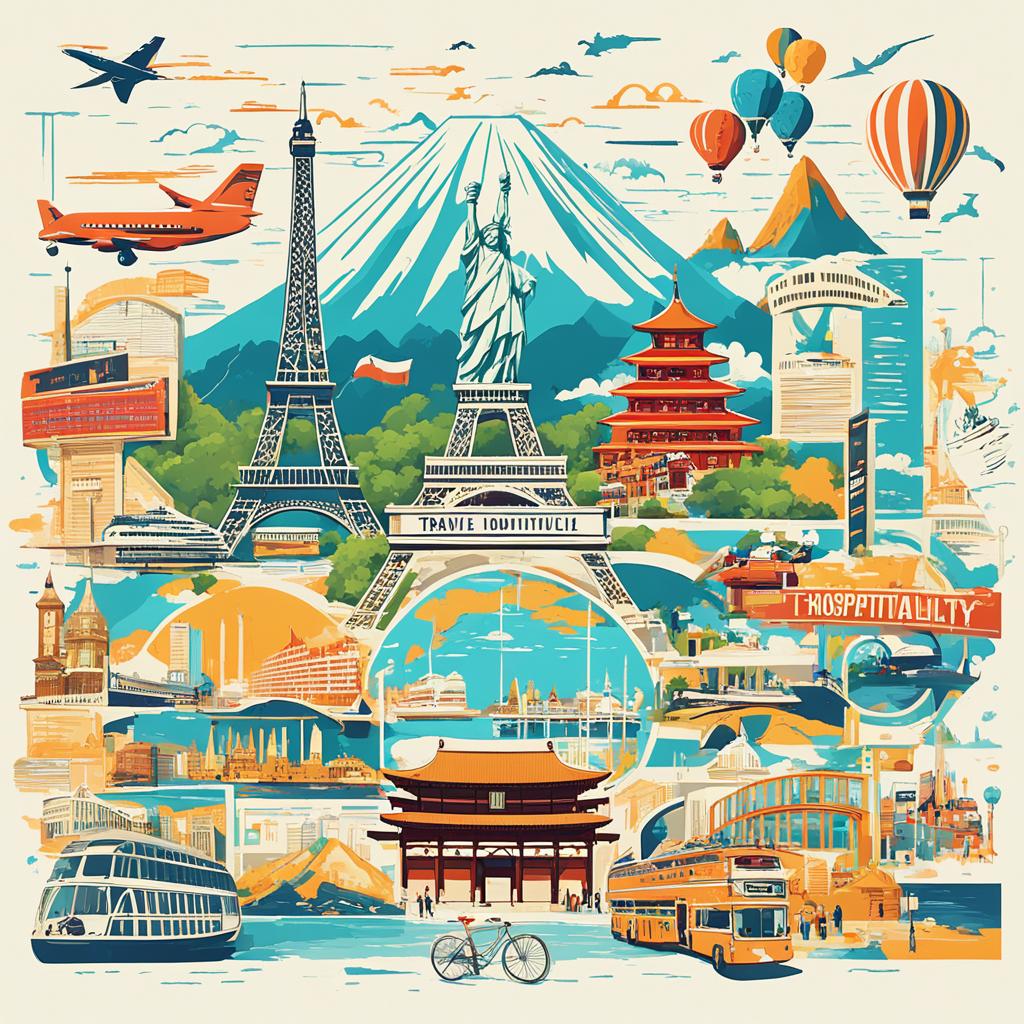Have you ever wondered how the tourism and hospitality industry came to be? How did it evolve from humble beginnings to become a major global industry generating billions of dollars in revenue? Discover the fascinating journey of the tourism and hospitality industry throughout history, and learn about its significant impact on economies, societies, and the environment.
From ancient times to the modern era, travel has played a crucial role in human civilization. Young wealthy Europeans embarked on educational and cultural journeys around Europe in the 1700s, paving the way for what we now know as tourism. The concept of hospitality, the welcoming reception of guests, has been a part of societies throughout history, with the earliest evidence dating back to 15,000 BCE.
But how did tourism and hospitality truly evolve over time? What were the origins of the hospitality industry, and how did it transform from private homes welcoming strangers passing through to luxurious hotels with world-class amenities? Explore the intriguing history of hospitality and the significance of inns and lodging facilities in providing shelter and sustenance to travelers.
As travel technology advanced, tourism became more accessible and affordable. The 18th century marked a turning point with the emergence of the Grand Tour, a journey undertaken by British aristocrats seeking educational and cultural experiences. Discover how the grand tour set the stage for organized leisure travel and explore the development of modern tourism through significant milestones like the introduction of commercial air travel in the 1950s and the internet revolution in recent decades.
However, the impacts of tourism extend beyond the economy. As a traveler, you have the opportunity to experience different cultures, foster cultural exchange, and contribute to community development. Nevertheless, tourism can also have negative social impacts, such as overcrowding and the displacement of local residents. Explore the social and environmental implications of tourism, and learn about the importance of sustainable practices to mitigate these effects.
So, join us on a journey through time as we uncover the captivating history of the tourism and hospitality industry. Delve into the origins, evolution, economic impacts, social effects, and environmental implications of this transformative industry. From ancient caves to bustling cities, from luxury hotels to remote destinations, the history of tourism and hospitality will captivate you every step of the way.
Origins of Hospitality Industry

The origins of the hospitality industry can be traced back to ancient times. Throughout history, the concept of hospitality, the welcoming reception of guests, has been a fundamental part of societies around the world. Ancient civilizations, such as the Greeks and Romans, practiced various forms of hospitality, emphasizing the importance of offering comfort and care to travelers.
One of the earliest forms of ancient hospitality can be seen in the caves of France, which were designed to accommodate visiting tribes as early as 15,000 BCE. These caves provided evidence of the early roots of hospitality, where strangers were welcomed and provided shelter.
Inns and lodging facilities began to emerge in the 17th century as a response to the increasing need for shelter and food for travelers. These early inns were often private homes that opened their doors to strangers passing through. They offered basic accommodations and meals, providing a temporary home away from home for weary travelers.
The 19th century saw the development of luxury hotels that catered to the growing demands and expectations of travelers. One notable example is the Tremont Hotel, built in Boston in 1829, which set a benchmark for the industry. This paved the way for the evolution of hotels as we know them today, offering a wide range of amenities and services to meet the diverse needs and desires of travelers worldwide.
| Key Milestones in the Origins of the Hospitality Industry | Timeline |
|---|---|
| Early forms of hospitality observed in ancient caves | 15,000 BCE |
| Inns and lodging facilities begin to emerge | 17th century |
| Construction of the Tremont Hotel in Boston, setting the standard for luxury hotels | 1829 |
Evolution of Tourism

Tourism has undergone a remarkable evolution throughout history, reflecting changing societal needs and technological advancements. From its humble origins to the thriving industry we know today, the development of tourism has shaped the way we explore the world.
In ancient times, travel was primarily driven by survival and trade. People embarked on long journeys in search of resources and economic opportunities. However, as societies progressed, the concept of leisure travel began to emerge.
The 18th century marked a significant turning point with the advent of the “Grand Tour.” British aristocrats embarked on extensive journeys across Europe to gain cultural and educational experiences. This organized leisure travel laid the foundation for the modern tourism industry we see today.
Advancements in travel technology played a crucial role in the evolution of tourism. The introduction of commercial air travel in the 1950s revolutionized the industry, making it more accessible and affordable for the masses. Suddenly, distant destinations became within reach, and people could fulfill their wanderlust like never before.
The internet further accelerated the development of the tourism industry. With the rise of online travel agencies and booking platforms, planning and booking vacations became more convenient than ever. Travelers could research destinations, compare prices, and arrange accommodations and transportation with just a few clicks.
Today, tourism encompasses a wide range of experiences. Whether it’s leisure tourism for relaxation, business tourism for conferences and meetings, medical tourism for healthcare services, or adventure tourism for adrenaline-filled escapades, the industry caters to diverse interests.
The Evolution of Tourism:
| Era | Main Features |
|---|---|
| Ancient Times | Travel for survival and trade |
| 18th Century | Grand Tour of British aristocrats for educational and cultural experiences |
| 1950s | Introduction of commercial air travel, making tourism more accessible |
| Present | Diverse forms of tourism catering to various interests and preferences |
The evolution of tourism has not only transformed the way we travel but also greatly impacted economies and cultures worldwide. As the industry continues to evolve, it’s vital to ensure sustainable practices and responsible tourism to preserve destinations for future generations.
Economic Impacts of Tourism
Tourism plays a significant role in driving economic growth and development worldwide. The industry generates substantial revenue and creates numerous employment opportunities, making it an essential contributor to local and global economies.
In 2011, international tourism receipts surpassed an unprecedented $1 trillion, highlighting the immense financial impact of tourism on a global scale. This milestone solidified tourism as one of the leading export industries, with its economic benefits extending far beyond individual destinations.
The tourism sector is known for its labor-intensive nature, providing employment to millions of people around the world. The hotel industry, in particular, is a significant source of jobs, with over 4.5 million individuals working in hotels alone. From front desk staff to housekeeping, these roles contribute to the overall functioning of the tourism industry and support local economies.
Tourism revenue also ripples through various sectors, stimulating growth and prosperity in related industries. Transportation services, including airlines and railways, benefit from increased tourist arrivals, while the accommodation sector experiences higher demand for hotels, resorts, and other lodging facilities. Additionally, food and beverage services, entertainment venues, and souvenir shops all thrive as a result of tourism expenditures.
One notable example of the economic impacts of tourism can be seen in Europe. Tourism accounts for a significant percentage of the continent’s GDP, reflecting the industry’s role in driving economic activity and financial stability in the region.
| Key Economic Impacts of Tourism | Examples |
|---|---|
| Revenue Generation | Tourism receipts exceeding $1 trillion globally |
| Employment | Over 4.5 million jobs in the hotel industry alone |
| Sector Growth | Stimulating transportation, accommodation, food and beverage, and entertainment industries |
| Contribution to GDP | Significant percentage of GDP in regions like Europe |
As the tourism industry continues to thrive, its economic impacts remain a key driver of growth and prosperity. The industry’s ability to generate revenue, create employment opportunities, and support diverse sectors underscores its vital role in shaping local, national, and global economies.
Social Impacts of Tourism

Tourism has profound social impacts on both travelers and the communities they visit. One of the significant benefits of tourism is the opportunity for cultural exchange and understanding. When you travel, you have the chance to immerse yourself in different cultures, traditions, and ways of life. This fosters empathy, respect, and a broader worldview. Whether it’s learning about local customs, trying new cuisines, or participating in traditional celebrations, cultural exchange enriches your travel experience.
Furthermore, tourism can contribute to community development in destinations worldwide. The influx of tourists often brings investment and infrastructure improvements to local communities. Funds generated from tourism revenue can be channeled towards the development of schools, hospitals, transportation systems, and other essential facilities. These developments enhance the quality of life for both residents and visitors and create economic opportunities through job creation and entrepreneurship.
However, it is crucial to acknowledge that tourism can also have negative social impacts that must be addressed. Overcrowding due to excessive tourism can strain local resources and lead to a decline in the quality of life for residents. Moreover, cultural commodification, where cultural traditions and heritage become commercialized for tourist consumption, can erode the authenticity and integrity of local cultures.
Another social impact to consider is the potential displacement of local residents due to tourism-related factors such as the conversion of residential space into tourist accommodations or rising property prices. These issues can lead to the loss of community cohesion and cultural identity.
Therefore, it is essential for the tourism industry to prioritize sustainable practices that mitigate the negative social impacts of tourism. Sustainable tourism focuses on responsible travel, preserving local cultures, and supporting the well-being of host communities. By promoting respectful interaction between travelers and residents, the industry can ensure that tourism benefits everyone involved while preserving the social fabric and cultural diversity of destinations.
| Positive Social Impacts | Negative Social Impacts |
|---|---|
| Cultural exchange and understanding | Overcrowding |
| Community development and investment | Cultural commodification |
| Job creation and economic opportunities | Displacement of local residents |
Environmental Impacts of Tourism
Tourism is undoubtedly a popular and thriving industry, but it is not without its environmental consequences. The carbon emissions, water and energy consumption, and waste generation associated with tourism can have a significant impact on the environment. However, there is a growing recognition of the need for sustainable tourism practices to minimize these impacts and promote a greener future.
Sustainable tourism aims to protect natural and cultural resources, support local communities, and reduce negative environmental effects. By adopting sustainable practices, the tourism industry can play a vital role in preserving the delicate ecosystems and biodiversity in popular travel destinations.
Thankfully, initiatives like eco-tourism and responsible travel have gained traction in recent years. These movements encourage travelers to make conscious choices that minimize their carbon footprint and support local communities. From choosing eco-friendly accommodations and transportation options to engaging in activities that respect the local culture and environment, individuals can contribute to creating a more sustainable tourism industry.
It is the collective responsibility of travelers, industry stakeholders, and governments to prioritize sustainable tourism practices. By embracing green initiatives and making environmentally-conscious choices, we can ensure that future generations continue to enjoy the incredible beauty and wonders our world has to offer without compromising its ecological integrity.
FAQ
Q: What is the history of the tourism and hospitality industry?
A: The history of the tourism and hospitality industry can be traced back to ancient times. In the 1700s, young wealthy Europeans began traveling around Europe for educational and cultural purposes. The concept of hospitality, the welcoming reception of guests, has been a part of societies throughout history. The tourism industry as we know it today began to emerge in the 18th century with the Grand Tour of British aristocrats. Over time, travel technology advanced, making tourism more accessible and affordable. In the 20th century, the industry saw significant growth with the rise of hotel chains and the introduction of new modes of travel. Today, the tourism and hospitality industry is a major global industry, generating billions of dollars in revenue.
Q: What are the origins of the hospitality industry?
A: The origins of the hospitality industry can be traced back to ancient times. Caves in France designed to accommodate visiting tribes have been found dating back to 15,000 BCE, providing evidence of early forms of hospitality. Inns and lodging facilities began to emerge in the 17th century, providing shelter and food to travelers. These early inns were often private homes that welcomed strangers passing through. The concept of luxury hotels began to develop in the 19th century, with the construction of the Tremont Hotel in Boston in 1829, which set a benchmark for the industry. Hotels evolved to offer more amenities and services, catering to the needs and desires of travelers.
Q: How has tourism evolved over time?
A: Tourism has evolved over time as people’s reasons for traveling changed. In ancient times, travel was primarily for survival and trade. The grand tour of British aristocrats in the 18th century marked the beginning of organized leisure travel, with travelers seeking educational and cultural experiences. With advancements in travel technology, such as the introduction of commercial air travel in the 1950s, tourism became more accessible to the masses. The internet has further revolutionized the industry, making it easier for people to research and book vacations. Today, there are various forms of tourism, including leisure, business, medical, and adventure tourism.
Q: What are the economic impacts of tourism?
A: Tourism has significant economic impacts globally. In 2011, international tourism receipts exceeded
FAQ
Q: What is the history of the tourism and hospitality industry?
A: The history of the tourism and hospitality industry can be traced back to ancient times. In the 1700s, young wealthy Europeans began traveling around Europe for educational and cultural purposes. The concept of hospitality, the welcoming reception of guests, has been a part of societies throughout history. The tourism industry as we know it today began to emerge in the 18th century with the Grand Tour of British aristocrats. Over time, travel technology advanced, making tourism more accessible and affordable. In the 20th century, the industry saw significant growth with the rise of hotel chains and the introduction of new modes of travel. Today, the tourism and hospitality industry is a major global industry, generating billions of dollars in revenue.
Q: What are the origins of the hospitality industry?
A: The origins of the hospitality industry can be traced back to ancient times. Caves in France designed to accommodate visiting tribes have been found dating back to 15,000 BCE, providing evidence of early forms of hospitality. Inns and lodging facilities began to emerge in the 17th century, providing shelter and food to travelers. These early inns were often private homes that welcomed strangers passing through. The concept of luxury hotels began to develop in the 19th century, with the construction of the Tremont Hotel in Boston in 1829, which set a benchmark for the industry. Hotels evolved to offer more amenities and services, catering to the needs and desires of travelers.
Q: How has tourism evolved over time?
A: Tourism has evolved over time as people’s reasons for traveling changed. In ancient times, travel was primarily for survival and trade. The grand tour of British aristocrats in the 18th century marked the beginning of organized leisure travel, with travelers seeking educational and cultural experiences. With advancements in travel technology, such as the introduction of commercial air travel in the 1950s, tourism became more accessible to the masses. The internet has further revolutionized the industry, making it easier for people to research and book vacations. Today, there are various forms of tourism, including leisure, business, medical, and adventure tourism.
Q: What are the economic impacts of tourism?
A: Tourism has significant economic impacts globally. In 2011, international tourism receipts exceeded $1 trillion for the first time. Tourism is considered a key export and labor-intensive industry, contributing to the growth of economies. The tourism industry creates jobs for millions of people worldwide, with over 4.5 million jobs in the hotel industry alone. Tourism also generates revenue for various sectors, such as transportation, accommodation, food and beverage services, and entertainment. In regions like Europe, tourism accounts for a significant percentage of GDP.
Q: What are the social impacts of tourism?
A: Tourism has social impacts on both travelers and host communities. Traveling allows individuals to experience different cultures and traditions, fostering cultural exchange and understanding. Tourism can also contribute to community development, as it often brings investment and infrastructure improvements to destinations. However, tourism can also have negative social impacts, such as overcrowding, cultural commodification, and the displacement of local residents. It is important for the industry to consider these social impacts and promote sustainable tourism practices.
Q: What are the environmental impacts of tourism?
A: Tourism has environmental impacts that need to be addressed for sustainable development. The tourism industry can contribute to carbon emissions, water and energy consumption, and waste generation. However, there has been a growing emphasis on sustainable tourism practices to minimize these impacts. Sustainable tourism aims to protect natural and cultural resources, support local communities, and minimize negative environmental effects. Initiatives such as eco-tourism and responsible travel have gained popularity in recent years, promoting sustainable practices among travelers and industry stakeholders.
trillion for the first time. Tourism is considered a key export and labor-intensive industry, contributing to the growth of economies. The tourism industry creates jobs for millions of people worldwide, with over 4.5 million jobs in the hotel industry alone. Tourism also generates revenue for various sectors, such as transportation, accommodation, food and beverage services, and entertainment. In regions like Europe, tourism accounts for a significant percentage of GDP.
Q: What are the social impacts of tourism?
A: Tourism has social impacts on both travelers and host communities. Traveling allows individuals to experience different cultures and traditions, fostering cultural exchange and understanding. Tourism can also contribute to community development, as it often brings investment and infrastructure improvements to destinations. However, tourism can also have negative social impacts, such as overcrowding, cultural commodification, and the displacement of local residents. It is important for the industry to consider these social impacts and promote sustainable tourism practices.
Q: What are the environmental impacts of tourism?
A: Tourism has environmental impacts that need to be addressed for sustainable development. The tourism industry can contribute to carbon emissions, water and energy consumption, and waste generation. However, there has been a growing emphasis on sustainable tourism practices to minimize these impacts. Sustainable tourism aims to protect natural and cultural resources, support local communities, and minimize negative environmental effects. Initiatives such as eco-tourism and responsible travel have gained popularity in recent years, promoting sustainable practices among travelers and industry stakeholders.
